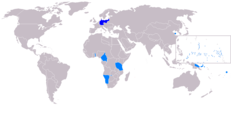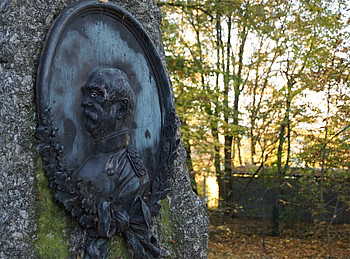A Coffee with... Dr. Regina Wick, Uni Archivist
Hohenheim Investigates Colonial Past [27.01.22]

Dr. Regina Wick heads the University Archives. Image: Wick
-
Ms. Wick, research into Hohenheim's colonial past was one of your first projects as the new head of the University Archives. What provided the initial idea?
If we want to overcome racism in today's society, we must also understand the roots of such thought patterns and recognize injustice and suffering inflicted on people as a result of aggressive European expansionist policies as such.
I am therefore pleased that, in addition to a confrontation with the Nazi past, a broader social debate on German colonial history is currently getting underway. This is definitely necessary.
For example, Stuttgart's city council has commissioned a preliminary study on the city's colonial past, and a whole series of universities have recently begun to reexamine their own history from this point of view. Our President therefore suggested that we at the University of Hohenheim also begin this examination and get an initial overview of the sources.
What exactly is the period in question? And why is there a broader social debate only now?
Most of the colonies of the German Empire were acquired towards the end of the 1880s and had to be ceded again at the latest when the Treaty of Versailles came into force in 1920.
If one follows the common terminological distinction between National Socialist expansionist policy in the European East and German colonial rule, the latter actually spanned "only" just under four decades. In European comparison, this is relatively short. Moreover, the examination of this chapter of history has so far been very much overshadowed by other topics, especially the reappraisal of the Nazi era.
However, we are talking about four decades whose effects on the regions concerned can still be clearly felt today and whose influence continues to be visible in our society today.
For this reason, Germany's historical responsibility is still the subject of controversial debate. Last year, for example, after intensive talks with the Namibian government, the German government acknowledged the German genocide against the Herero and Nama and agreed to pay 1.1 billion euros into a program for reconstruction aid and development.
Were there any concrete indications that the University of Hohenheim or individual members were involved in colonialist activities?
At the time I began my research, there were no concrete indications of this. However, there had simply been no investigations into the matter up to that point.
Deutsche Kolonien |

Bild: Wikimedia Commons | CC BY-SA 3.0 | Joe Mabel
Die deutschen Kolonien umfassten Gebiete der heutigen Staaten Volksrepublik China, Burundi, Ruanda, Tansania, Namibia, Kamerun, Gabun, Republik Kongo, Zentralafrikanische Republik, Tschad, Nigeria, Togo, Ghana, Papua-Neuguinea, und mehrere Inseln im Westpazifik und Mikronesien.
In den Kolonien kam es immer wieder zu Aufständen, die von den Kolonialherren brutal niedergeschlagen wurden. Seit 2021 erkennt die Bundesregierung den von Deutschen begangenen Völkermord an den Herero und Nama im heutigen Namibia an. Mehr… |
In the last few years, the University of Hohenheim has been very intensively involved in coming to terms with the Nazi era. It became clear that the professors of the time were highly national-conservative and that some of them were actively engaged in the interests of those in power during the Nazi regime. It would not have surprised me if the German colonial efforts, which were seen as a national prestige project of the first order, had found support in Hohenheim.
In addition, the Faculty of Agricultural Sciences in Hohenheim has a designated tropical focus with 10 professorships. Admittedly, this was only established in the 1970s. Nevertheless, it is theoretically not impossible that a loose connection with former colonialist activities exists - perhaps in the form of a critical discussion or out of the motive of reparation.
What did your research reveal?
In fact, I was able to locate significantly fewer sources in the University Archives directly related to colonialist activities than I had originally expected.
These sources focus primarily on three topics:
Hohenheim was a member of the German Colonial Society, which had been founded in 1887 with the aim of anchoring the - and I quote - "colonial idea" in German society. There were also plans for a colonial monument or the planting of a memorial tree, although it remains unclear what ultimately became of it. And preparations were underway for the founding of a so-called "German Settlement School" that would prepare young Germans for service in the colonies and assist in the preservation of "Germanness." However, these plans were not realized.
That means the colonialist ideology was accepted and supported in Hohenheim...
Yes, but the sources do not give the impression that Hohenheim decision-makers were particularly active and showed extraordinary interest in the subject. The initiative for the colonial monument and the settlers' school came from outside and the projects were apparently pushed forward in Hohenheim rather dispassionately, if at all.
Membership in the German Colonial Society also seems to have been more of a formal affair, according to all the sources we have. Very many universities were members there at the time. Hohenheim actors, however, apparently did not contribute any initiatives of their own.
During the Nazi period, interest in the topic still seems to have been rather low. As far as we know, only two professors from Hohenheim followed the call to join the German Colonial League founded by the National Socialists, which was dedicated to the so-called "struggle for the return of our protectorates".
I must emphasize, however, that my research is a first overview and it is possible that relevant source material can still be found elsewhere. A starting point for further research could be the archival records of the German Colonial Society in the Federal Archives in Berlin.
What exactly were the plans for the "German Settlement School"?
Hohenheim und der Nationalsozialismus |

|
The Settlement School was to have been built in the area of the Exotic Garden. The model was the German Colonial School Wilhelmshof, founded in Witzenhausen in 1898, whose aim was to train suitable skilled workers for service in the colonies.
Efforts to do so were primarily based on the "Verein zur Vorbildung Deutscher Ansiedler" (VVDA - Association for the Previous Education of German Settlers), founded in Stuttgart in 1908, and were supported by Adolf Foehr, among others, who had been a student at the Hohenheim Academy a few years earlier.
The project was not implemented because it was not possible to raise sufficient funds and Adolf Foehr, one of the main driving forces, ultimately withdrew from the project in 1909.
The funds already collected were handed over to the university for administration after the project was abandoned. They were to be used to support "those applying to be German Empire settlers" in attending the university or "young German farmers" in learning foreign languages. In the first three years, however, no applicants were found in response to advertisements in various newspapers. With increasing inflation, it was suggested in 1923 that the contributions be used up elsewhere as quickly as possible.
And what became of the planned colonial monument?
In 1924, the German Colonial Society initiated the planting of memorial trees in many places. After the forced surrender of the colonial territories, they were supposed to be a "visible sign" that Germany did not want to permanently agree to the Versailles agreements and that the colonial idea lived on in the German people.
Such a memorial tree was also to be planted in Hohenheim. But things turned out differently. Although there was no fundamental opposition to the idea, there was also little commitment. In a letter of April 1924, it is stated quite succinctly: "On the part of the estate management, there is no objection to a memorial tree [...]."
When staff members of the German Colonial Society then inquired in September 1925 whether the tree was thriving, the acting President replied: "An order to plant a colonial tree in memory of Bismarck has not been issued here, which is why no tree has been planted. However, opposite the large walnut tree at the entrance to the experimental field by Turmallee is a young, very beautiful walnut tree that could be used for this purpose."
This is not a particularly enthusiastic reply, and it also remains an open question whether the planned dedication ceremony was ever realized.
There is, however, a Bismarck monument on the Hohenheim campus.
Correct. It dates back to 1900 and was donated by the student body of the Agricultural College on the occasion of the 100th birthday of Otto von Bismarck. However, this was apparently done primarily to honor Bismarck's role as statesman and founder of the German Empire. The colonial policy of the former Chancellor of the Reich finds at least no mention in the surviving speeches delivered at the inauguration.
Were the colonies a topic in courses?
Das Hohenheimer Bismarck-Denkmal |

Otto von Bismarck war preußischer Ministerpräsident, Mitbegründer und Reichskanzler des Deutschen Reichs und gilt als Erfinder des deutschen Sozialversicherungssystems. Eines war er jedoch nicht: Ein Held der Schwaben. 1866 schießt ein Attentäter auf offener Straße auf den Politiker und wird dafür in Süddeutschland als Freiheitskämpfer gefeiert: Der ehemalige Hohenheimer Student Ferdinand Cohen-Blind. 150 Jahre später steht im Schlosspark dennoch ein Denkmal für den einst so heftig bekämpften Preußen. Mehr... |
An initial analysis of courses from 1845 to 1915 yields no hits on keywords such as "colony," "overseas," or "tropics." In the schedules from 1915 to 1935, there are only three courses on "colonial botany." In queries by the German Colonial Society about lectures on colonial science and related subjects at German universities for the years 1933 to 1936, Hohenheim did not report any events.
The situation is different at the level of individual biographies of Hohenheim students. For example, it is documented for individual students that they emigrated to German East Africa after completing their studies and worked there as plantation administrators or colonial officials. However, the sources on the later sphere of activity of Hohenheim students at the beginning of the 20th century are generally very thin.
What about the lecturers?
I have only been able to evaluate the personnel files of lecturers on a random basis. So far, I have only become aware of two incidents, which, however, took place before or after the people's work at Hohenheim.
Before his appointment at Hohenheim, Prof. Carl Fruwirth traveled overseas and wrote publications on the cultivation of colonial plants. Prof. Wilhelm von Branco, who directed the Hohenheim department of mineralogy and geology from 1895 to 1899, participated in the famous Tendaguru excavation expedition in Tanzania a few years after leaving Hohenheim.
Do you have an explanation for the overall rather reserved position of the university with regard to the colonial efforts of the German Reich?
We can at best speculate about this. Possibly the rural location played a role. Moreover, the founding mission put the focus very clearly on improving regional agriculture. The national-conservative attitude of the professors would have suggested a stronger commitment.
It must be remembered that the source material on the colonial period at the University Archives is relatively thin overall. The results of the research work must therefore remain provisional and it cannot be ruled out that the evaluation of further sources will one day lead to other conclusions.
In addition, the research so far has been exclusively related to the actual period of colonial possession by the German Empire; for the time being, we have excluded the effects of colonial patterns of perception well into the German postwar period or even until today.
An interesting focus for follow-up projects would be, for example, the analysis of colonial language patterns in intra-university discourses, e.g. in connection with research activities in the tropics and subtropics or in development aid projects. Generally speaking, it is to be expected that discourse patterns of the respective time can also be found in Hohenheim.
In short, the question of the continuities between the formal colonial period, the colonial revisionism of the interwar period, and the colonial aspirations of the National Socialists up to today's scientific enterprise will occupy us as a society for quite a while.
We will report back. Thank you very much for the interview.
Interview: Leonhardmair / Translation: Neudorfer